The Cambridge History of Japan, Vol. 1: Ancient Japan
Подождите немного. Документ загружается.

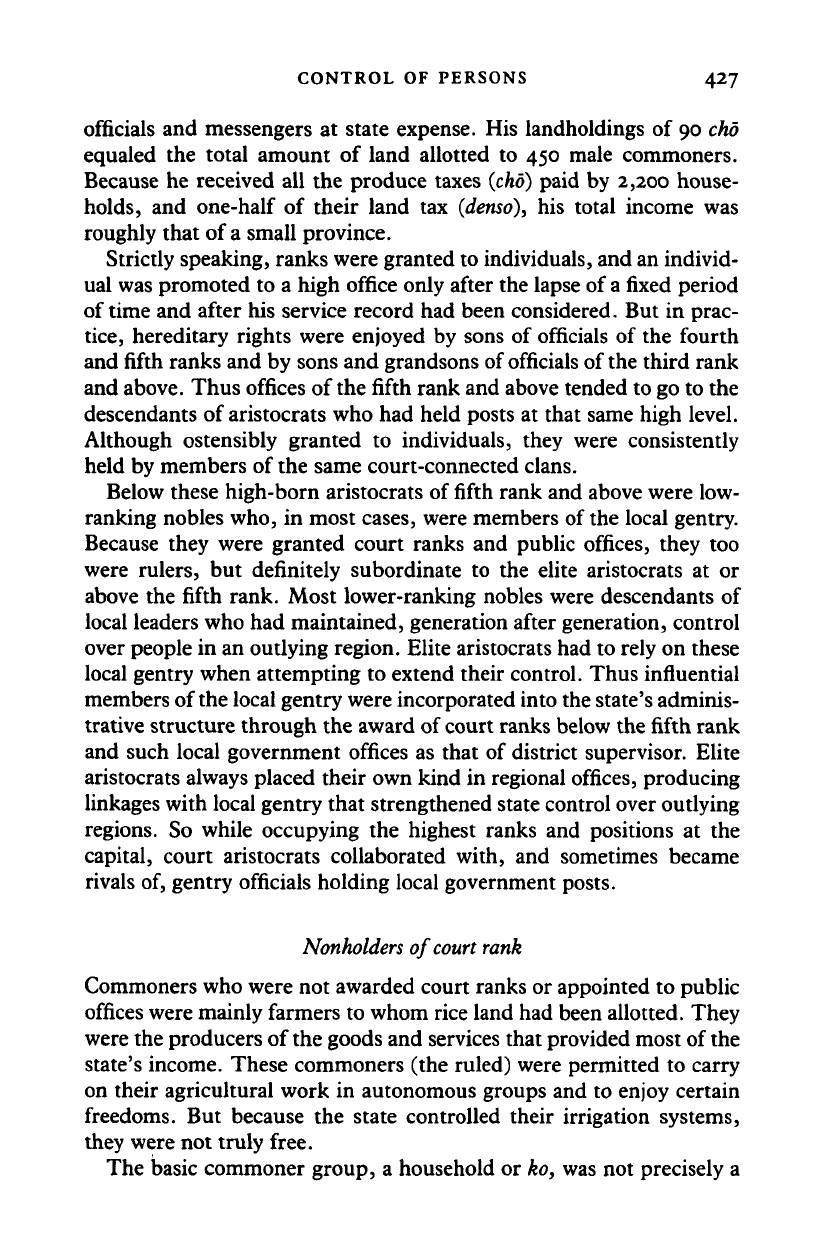
CONTROL OF PERSONS 427
officials and messengers at state expense. His landholdings of 90 chb
equaled the total amount of land allotted to 450 male commoners.
Because he received all the produce taxes
(cho)
paid by 2,200 house-
holds,
and one-half of their land tax
(denso),
his total income was
roughly that of
a
small province.
Strictly speaking, ranks were granted to individuals, and an individ-
ual was promoted to a high office only after the lapse of
a
fixed period
of time and after his service record had been considered. But in prac-
tice,
hereditary rights were enjoyed by sons of officials of the fourth
and fifth ranks and by sons and grandsons of officials of the third rank
and above. Thus offices of the fifth rank and above tended to go to the
descendants of aristocrats who had held posts at that same high level.
Although ostensibly granted to individuals, they were consistently
held by members of the same court-connected clans.
Below these high-born aristocrats of fifth rank and above were low-
ranking nobles who, in most cases, were members of the local gentry.
Because they were granted court ranks and public offices, they too
were rulers, but definitely subordinate to the elite aristocrats at or
above the fifth rank. Most lower-ranking nobles were descendants of
local leaders who had maintained, generation after generation, control
over people in an outlying region. Elite aristocrats had to rely on these
local gentry when attempting to extend their control. Thus influential
members of the local gentry were incorporated into the state's adminis-
trative structure through the award of court ranks below the fifth rank
and such local government offices as that of district supervisor. Elite
aristocrats always placed their own kind in regional offices, producing
linkages with local gentry that strengthened state control over outlying
regions. So while occupying the highest ranks and positions at the
capital, court aristocrats collaborated with, and sometimes became
rivals of, gentry officials holding local government posts.
Nonholders of court rank
Commoners who were not awarded court ranks or appointed to public
offices were mainly farmers to whom rice land had been allotted. They
were the producers of the goods and services that provided most of the
state's income. These commoners (the ruled) were permitted to carry
on their agricultural work in autonomous groups and to enjoy certain
freedoms. But because the state controlled their irrigation systems,
they were not truly free.
The basic commoner group, a household or ko, was not precisely a
Cambridge Histories Online © Cambridge University Press, 2008
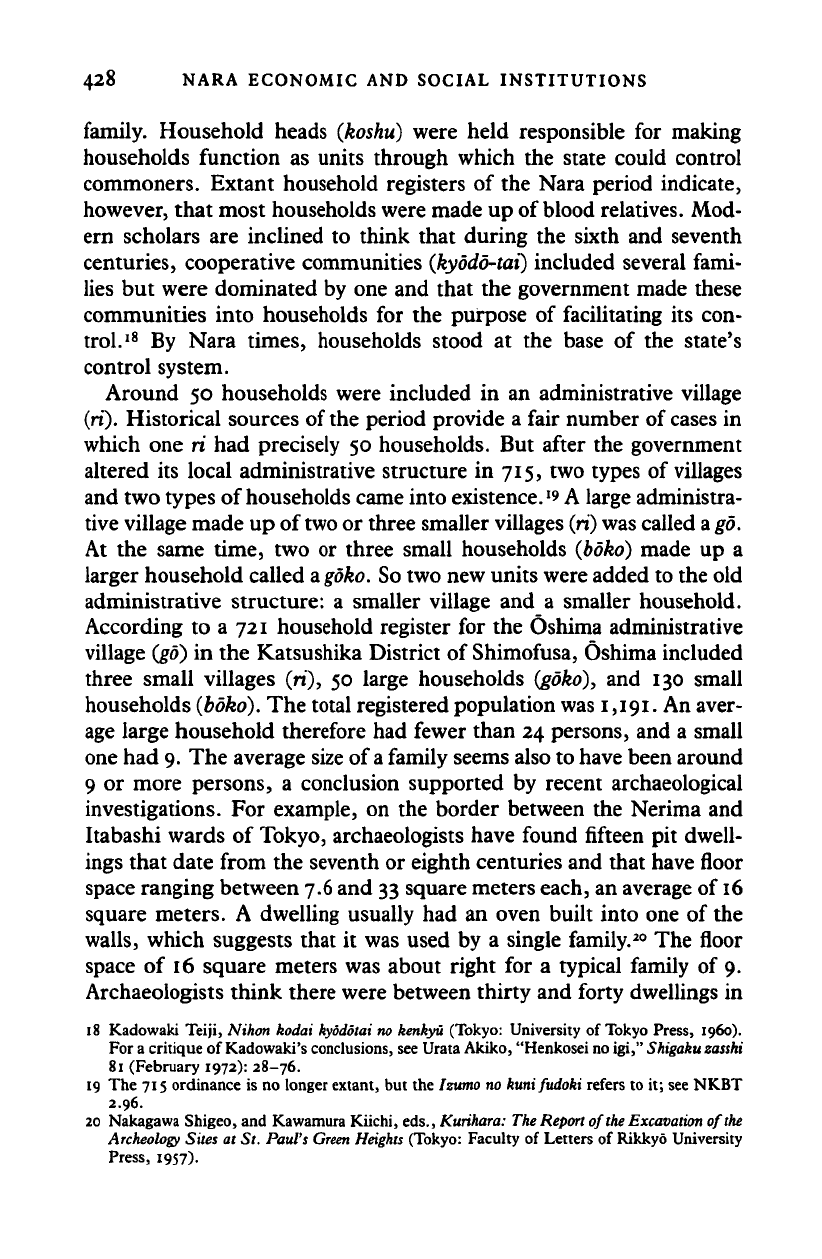
428 NARA ECONOMIC AND SOCIAL INSTITUTIONS
family. Household heads (koshu) were held responsible for making
households function as units through which the state could control
commoners. Extant household registers of the Nara period indicate,
however, that most households were made up of blood relatives. Mod-
ern scholars are inclined to think that during the sixth and seventh
centuries, cooperative communities
(kyodo-tai)
included several fami-
lies but were dominated by one and that the government made these
communities into households for the purpose of facilitating its con-
trol.
18
By Nara times, households stood at the base of the state's
control system.
Around 50 households were included in an administrative village
(ri).
Historical sources of the period provide a fair number of cases in
which one ri had precisely 50 households. But after the government
altered its local administrative structure in 715, two types of villages
and two types of households came into existence.
19
A
large administra-
tive village made up of
two
or three smaller villages
(ri)
was called
a
go.
At the same time, two or three small households
(boko)
made up a
larger household called
a
goko.
So two new units were added to the old
administrative structure: a smaller village and a smaller household.
According to a 721 household register for the Oshima administrative
village
(go)
in the Katsushika District of Shimofusa, Oshima included
three small villages (ri), 50 large households
(goko),
and 130 small
households
(boko).
The total registered population was 1,191. An aver-
age large household therefore had fewer than 24 persons, and a small
one had 9. The average size of a family seems also to have been around
9 or more persons, a conclusion supported by recent archaeological
investigations. For example, on the border between the Nerima and
Itabashi wards of Tokyo, archaeologists have found fifteen pit dwell-
ings that date from the seventh or eighth centuries and that have floor
space ranging between 7.6 and
33
square meters each, an average of
16
square meters. A dwelling usually had an oven built into one of the
walls,
which suggests that it was used by a single family.
20
The floor
space of 16 square meters was about right for a typical family of 9.
Archaeologists think there were between thirty and forty dwellings in
18 Kadowaki Teiji, Nihon kodai kyodotai no kenkyu (Tokyo: University of Tokyo Press, i960).
For a critique of Kadowaki's conclusions, see Urata Akiko, "Henkosei no igi," Shigaku
zasshi
81 (February 1972): 28-76.
19 The 715 ordinance is no longer extant, but the Izumo no kunifudoki refers to it; see NK.BT
2.96.
20 Nakagawa Shigeo, and Kawamura Kiichi, eds., Kunhara:
The
Report of
the
Excavation of the
Archeology Sites at St. Paul's
Green
Heights (Tokyo: Faculty of Letters of Rikkyo University
Press,
1957).
Cambridge Histories Online © Cambridge University Press, 2008
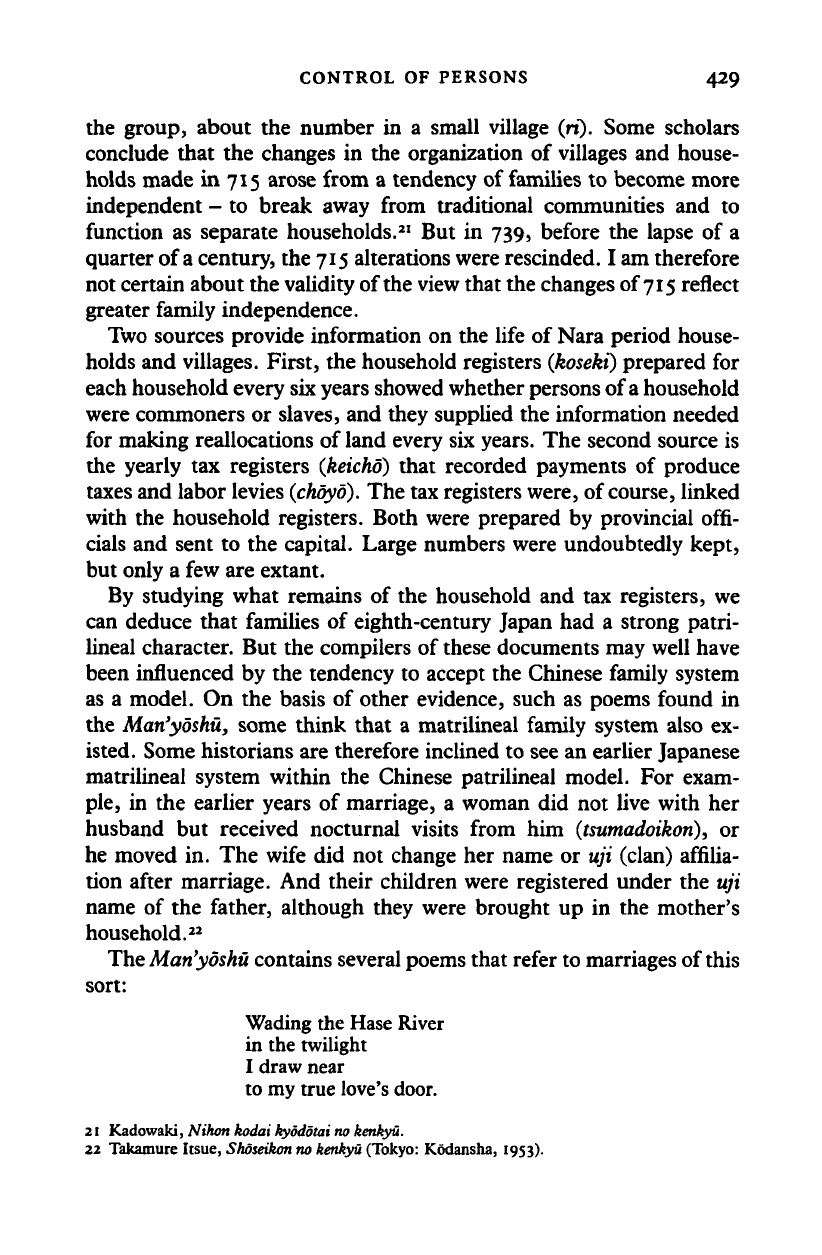
CONTROL OF PERSONS 429
the group, about the number in a small village (n). Some scholars
conclude that the changes in the organization of villages and house-
holds made in 715 arose from a tendency of famines to become more
independent - to break away from traditional communities and to
function as separate households.
21
But in 739, before the lapse of a
quarter of a century, the
715
alterations were rescinded. I am therefore
not certain about the validity of the view that the changes of 715 reflect
greater family independence.
Two sources provide information on the life of Nara period house-
holds and villages. First, the household registers
(koseki)
prepared for
each household every six years showed whether persons of
a
household
were commoners or slaves, and they supplied the information needed
for making reallocations of land every six years. The second source is
the yearly tax registers
(keicho)
that recorded payments of produce
taxes and labor levies
(choyo).
The tax registers were, of course, linked
with the household registers. Both were prepared by provincial offi-
cials and sent to the capital. Large numbers were undoubtedly kept,
but only a few are extant.
By studying what remains of the household and tax registers, we
can deduce that families of eighth-century Japan had a strong patri-
lineal character. But the compilers of these documents may well have
been influenced by the tendency to accept the Chinese family system
as a model. On the basis of other evidence, such as poems found in
the Mariyoshu, some think that a matrilineal family system also ex-
isted. Some historians are therefore inclined to see an earlier Japanese
matrilineal system within the Chinese patrilineal model. For exam-
ple,
in the earlier years of marriage, a woman did not live with her
husband but received nocturnal visits from him
(tsumadoikori),
or
he moved in. The wife did not change her name or uji (clan) affilia-
tion after marriage. And their children were registered under the uji
name of the father, although they were brought up in the mother's
household.
22
The
Man'yoshu
contains several poems that refer to marriages of this
sort:
Wading the Hase River
in the twilight
I draw near
to my true love's door.
21 Kadowaki, Nihon kodai kyodotai no kenkyu.
22 Takamure Itsue, Shoseikon no kenkyu (Tokyo: Kodansha, 1953)-
Cambridge Histories Online © Cambridge University Press, 2008
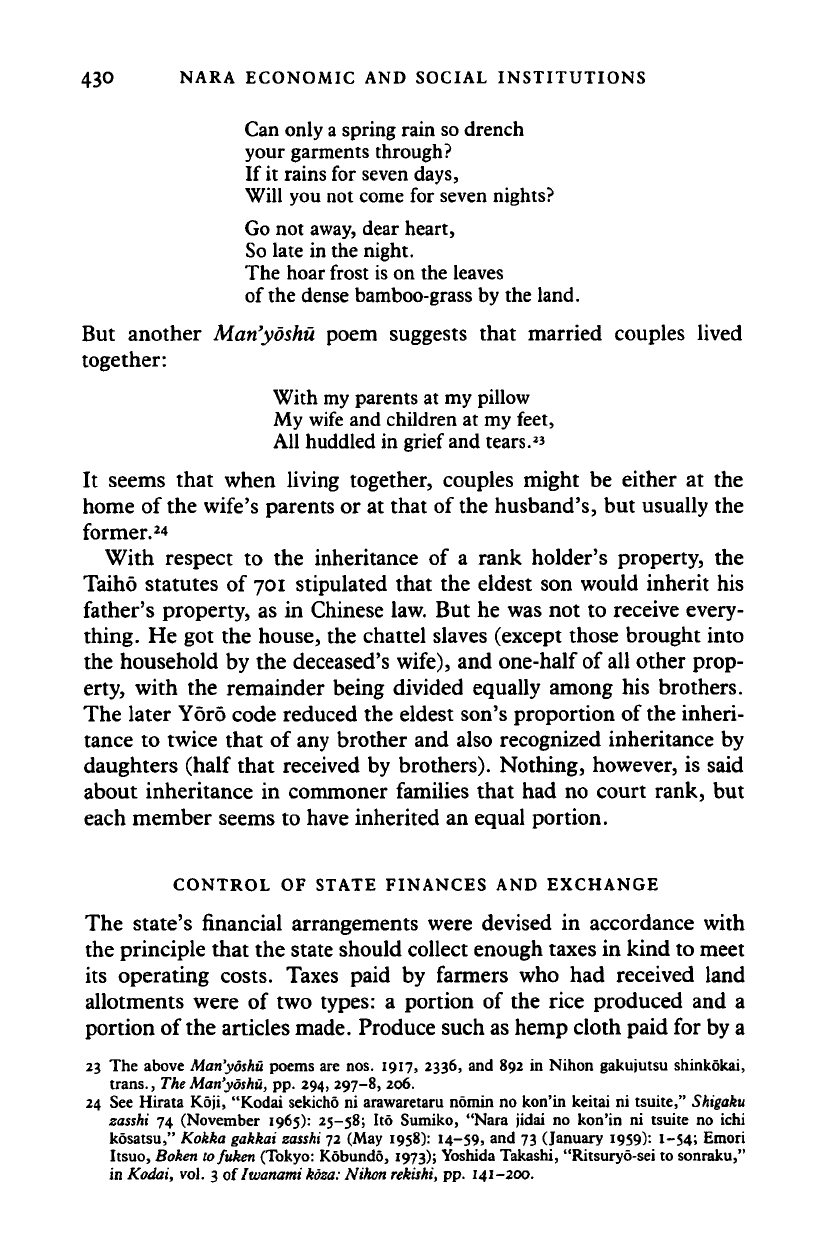
430 NARA ECONOMIC AND SOCIAL INSTITUTIONS
Can only
a
spring rain so drench
your garments through?
If it rains for seven days,
Will you not come for seven nights?
Go not away, dear heart,
So late in the night.
The hoar frost is on the leaves
of the dense bamboo-grass by the land.
But another Man'ydshil poem suggests that married couples lived
together:
With my parents at my pillow
My wife and children at my feet,
All huddled in grief and tears.
2
'
It seems that when living together, couples might be either at the
home of the wife's parents or at that of the husband's, but usually the
former.
2
*
With respect to the inheritance of a rank holder's property, the
Taiho statutes of 701 stipulated that the eldest son would inherit his
father's property, as in Chinese law. But he was not to receive every-
thing. He got the house, the chattel slaves (except those brought into
the household by the deceased's wife), and one-half of all other prop-
erty, with the remainder being divided equally among his brothers.
The later Yoro code reduced the eldest son's proportion of the inheri-
tance to twice that of any brother and also recognized inheritance by
daughters (half that received by brothers). Nothing, however, is said
about inheritance in commoner families that had no court rank, but
each member seems to have inherited an equal portion.
CONTROL OF STATE FINANCES AND EXCHANGE
The state's financial arrangements were devised in accordance with
the principle that the state should collect enough taxes in kind to meet
its operating costs. Taxes paid by farmers who had received land
allotments were of two types: a portion of the rice produced and a
portion of the articles made. Produce such as hemp cloth paid for by a
23 The above Man'yoshu poems are nos. 1917, 2336, and 892 in Nihon gakujutsu shinkokai,
trans.,
The Man'yoshu, pp. 294, 297-8, 206.
24 See Hirata Kdji, "Kodai sekicho ni arawaretaru nomin no kon'in keitai ni tsuite," Shigaku
zasshi 74 (November 1965): 25-58; ltd Sumiko, "Nara jidai no kon'in ni tsuite no ichi
kosatsu," Kokka gakkai zasshi 72 (May 1958): 14-59, and 73 (January 1959): 1-54; Emori
Itsuo,
Boken tofuken (Tokyo: Kobundo, 1973); Yoshida Takashi, "Ritsuryo-sei to sonraku,"
in Kodai, vol. 3 oilwanami koza: Nihon
rekishi,
pp. 141-200.
Cambridge Histories Online © Cambridge University Press, 2008
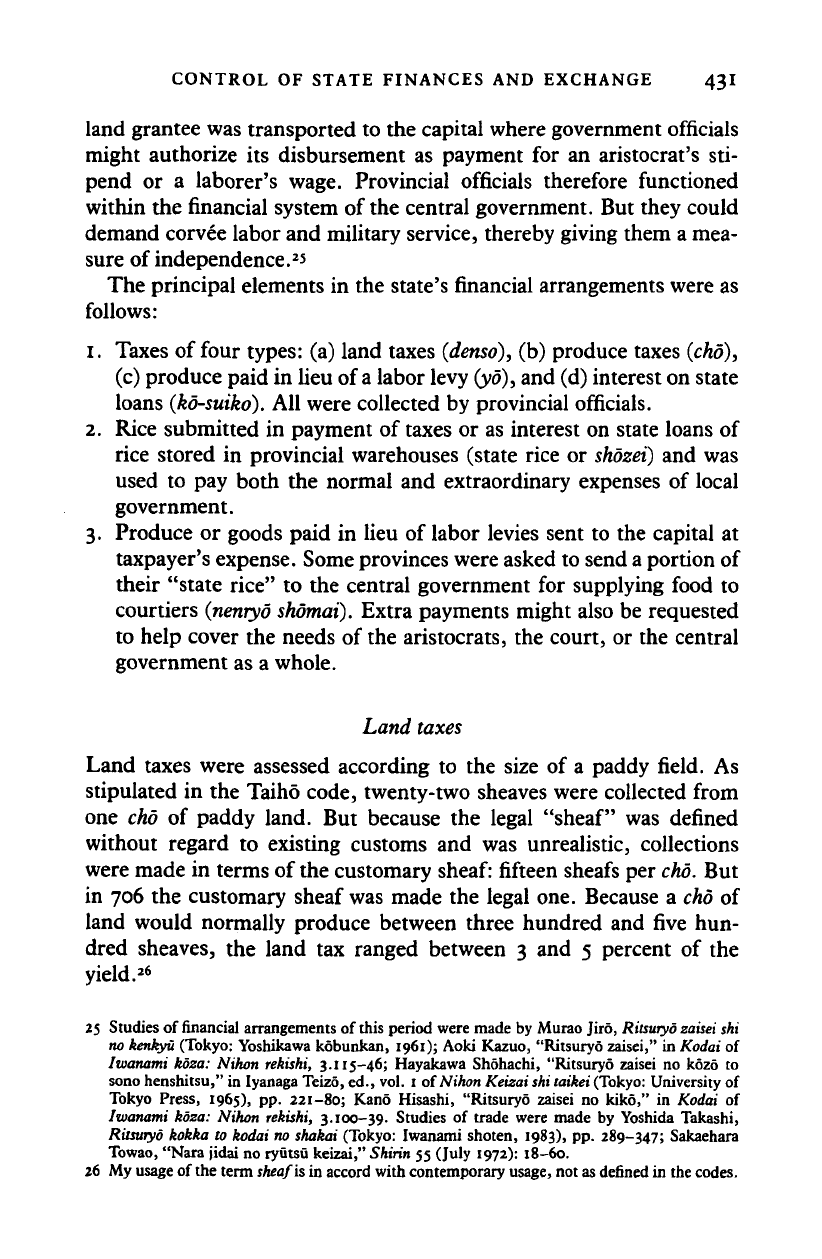
CONTROL
OF
STATE FINANCES
AND
EXCHANGE
431
land grantee
was
transported
to the
capital where government officials
might authorize
its
disbursement
as
payment
for an
aristocrat's
sti-
pend
or a
laborer's wage. Provincial officials therefore functioned
within
the
financial system
of the
central government.
But
they could
demand corvee labor
and
military service, thereby giving them
a mea-
sure
of
independence.
2
'
The principal elements
in the
state's financial arrangements were
as
follows:
1.
Taxes
of
four types:
(a)
land taxes (denso),
(b)
produce taxes (cho),
(c) produce paid
in
lieu
of
a
labor levy
(yd), and (d)
interest
on
state
loans (ko-suiko).
All
were collected
by
provincial officials.
2.
Rice submitted
in
payment
of
taxes
or as
interest
on
state loans
of
rice stored
in
provincial warehouses (state rice
or
shozei)
and was
used
to pay
both
the
normal
and
extraordinary expenses
of
local
government.
3.
Produce
or
goods paid
in
lieu
of
labor levies sent
to the
capital
at
taxpayer's expense. Some provinces were asked
to
send
a
portion
of
their "state rice"
to the
central government
for
supplying food
to
courtiers (nenryo shomai). Extra payments might also
be
requested
to help cover
the
needs
of the
aristocrats,
the
court,
or the
central
government
as a
whole.
Land taxes
Land taxes were assessed according
to the
size
of a
paddy field.
As
stipulated
in the
Taiho code, twenty-two sheaves were collected from
one
cho of
paddy land.
But
because
the
legal
"sheaf" was
defined
without regard
to
existing customs
and was
unrealistic, collections
were made
in
terms
of the
customary
sheaf:
fifteen sheafs
per
cho.
But
in
706 the
customary sheaf
was
made
the
legal
one.
Because
a
cho
of
land would normally produce between three hundred
and
five
hun-
dred sheaves,
the
land
tax
ranged between
3 and 5
percent
of the
yield.
26
25 Studies
of
financial arrangements
of
this period were made
by
Murao Jiro, Ritsuryo zaisei
shi
no kenkyu (Tokyo: Yoshikawa kobunkan, 1961); Aoki Kazuo, "Ritsuryo zaisei,"
in
Kodai
of
Ivianami koza: Nihon rekishi, 3.115-46; Hayakawa Shohachi, "Ritsuryo zaisei
no
kozo
to
sono henshitsu,"
in
Iyanaga Teizo,
ed., vol.
1 of Nihon Keizai shi taikei (Tokyo: University
of
Tokyo Press, 1965),
pp.
221-80; Kano Hisashi, "Ritsuryo zaisei
no
kiko,"
in
Kodai
of
Iwanami koza: Nihon rekishi, 3.100-39. Studies
of
trade were made
by
Yoshida Takashi,
Riiswyo kokka
to
kodai
no
shakai (Tokyo: Iwanami shoten, 1983),
pp.
289-347; Sakaehara
Towao, "Nara jidai
no
ryutsu keizai," Shirin
55
(July 1972): 18-60.
26
My
usage
of the
term sheaf 'is
in
accord with contemporary usage,
not as
defined
in the
codes.
Cambridge Histories Online © Cambridge University Press, 2008
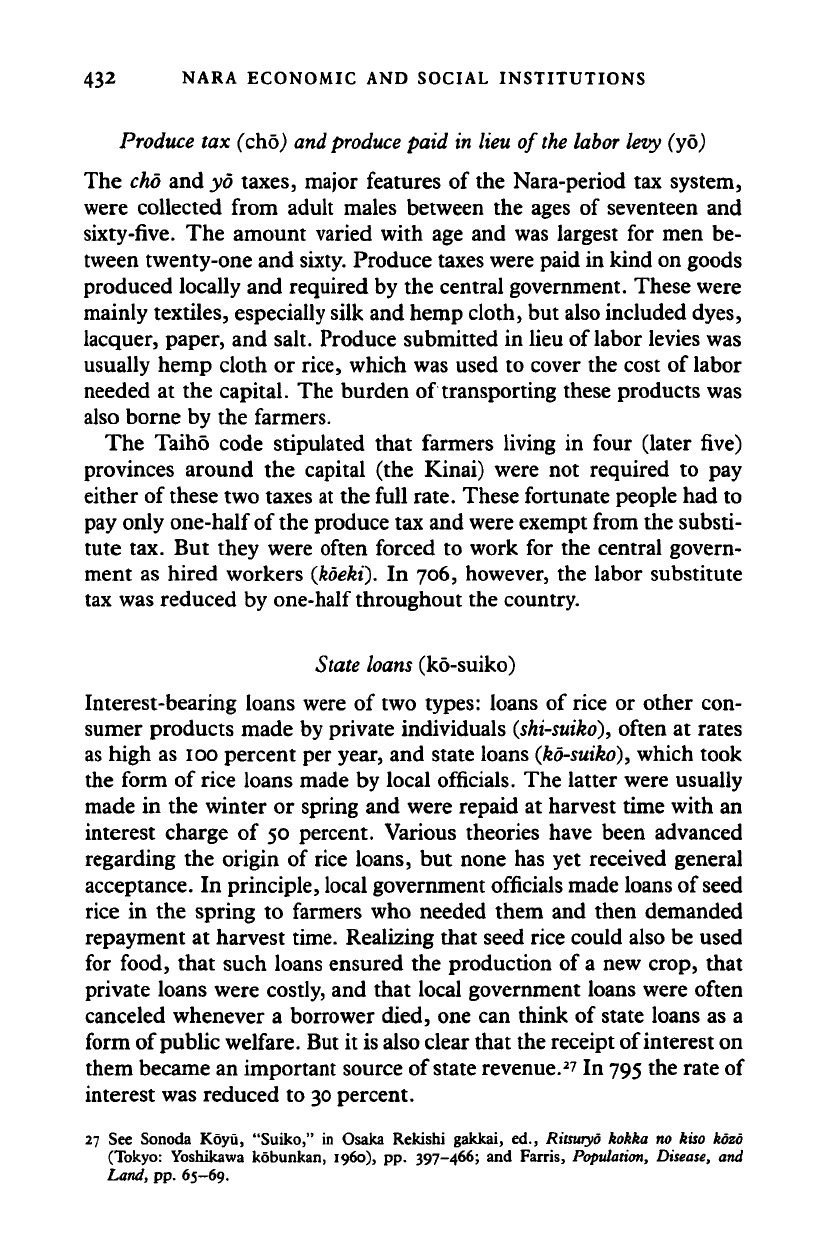
432 NARA ECONOMIC AND SOCIAL INSTITUTIONS
Produce tax (cho) and
produce
paid in lieu of
the
labor levy (yo)
The cho and yd taxes, major features of the Nara-period tax system,
were collected from adult males between the ages of seventeen and
sixty-five. The amount varied with age and was largest for men be-
tween twenty-one and sixty. Produce taxes were paid in kind on goods
produced locally and required by the central government. These were
mainly textiles, especially silk and hemp cloth, but also included dyes,
lacquer, paper, and salt. Produce submitted in lieu of labor levies was
usually hemp cloth or rice, which was used to cover the cost of labor
needed at the capital. The burden of transporting these products was
also borne by the farmers.
The Taiho code stipulated that farmers living in four (later five)
provinces around the capital (the Kinai) were not required to pay
either of these two taxes at the full rate. These fortunate people had to
pay only one-half of the produce tax and were exempt from the substi-
tute tax. But they were often forced to work for the central govern-
ment as hired workers
(koeki).
In 706, however, the labor substitute
tax was reduced by one-half throughout the country.
State
loans
(ko-suiko)
Interest-bearing loans were of two types: loans of rice or other con-
sumer products made by private individuals
(shi-suiko),
often at rates
as high as 100 percent per year, and state loans
{ko-suiko),
which took
the form of rice loans made by local officials. The latter were usually
made in the winter or spring and were repaid at harvest time with an
interest charge of 50 percent. Various theories have been advanced
regarding the origin of rice loans, but none has yet received general
acceptance. In principle, local government officials made loans of seed
rice in the spring to fanners who needed them and then demanded
repayment at harvest time. Realizing that seed rice could also be used
for food, that such loans ensured the production of a new crop, that
private loans were costly, and that local government loans were often
canceled whenever a borrower died, one can think of state loans as a
form of public welfare. But it is also clear that the receipt of interest on
them became an important source of state revenue.
27
In 795 the rate of
interest was reduced to 30 percent.
27 See Sonoda Koyu, "Suiko," in Osaka Rekishi gakkai, ed., Ritsuryo kokka no kiso kozo
(Tokyo: Yoshikawa kobunkan, i960), pp. 397-466; and Farris, Population, Disease, and
Land,
pp. 65-69.
Cambridge Histories Online © Cambridge University Press, 2008
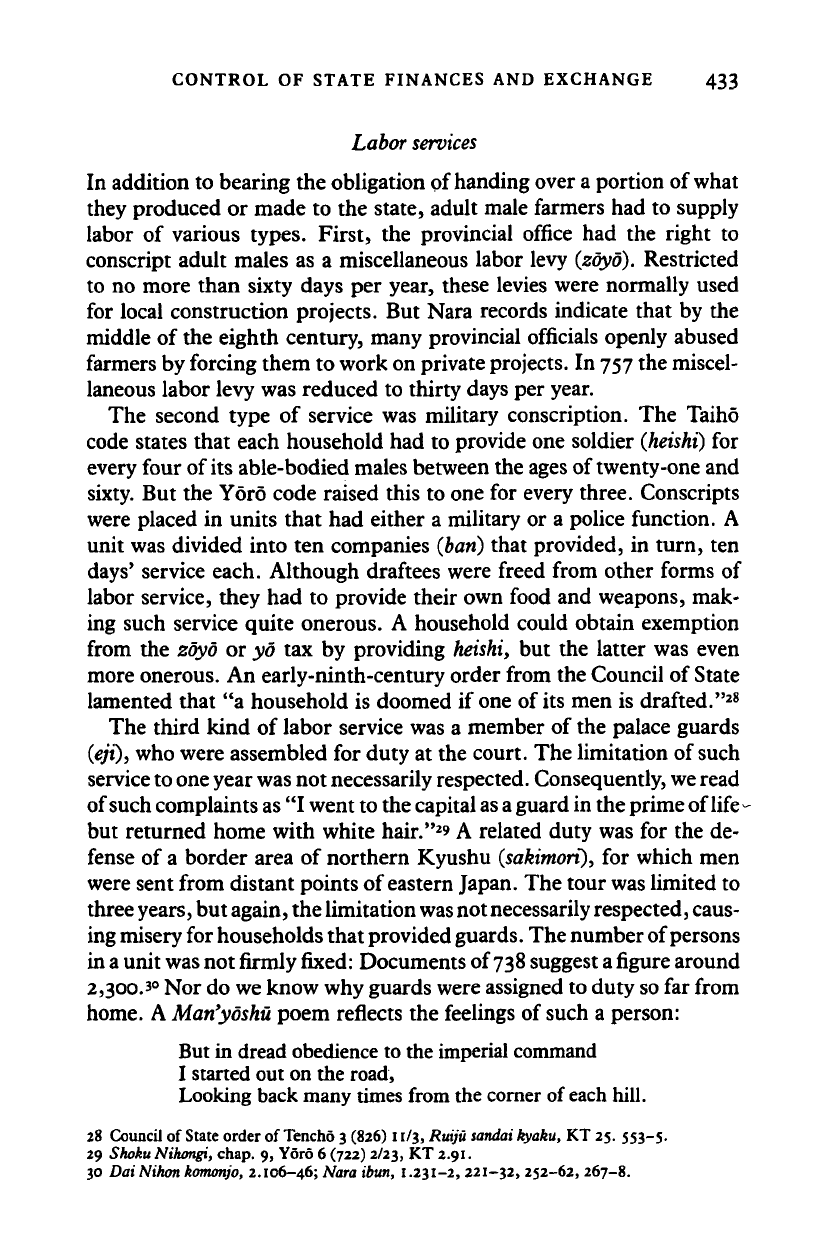
CONTROL OF STATE FINANCES AND EXCHANGE 433
Labor services
In addition to bearing the obligation of handing over a portion of what
they produced or made to the state, adult male farmers had to supply
labor of various types. First, the provincial office had the right to
conscript adult males as a miscellaneous labor levy (zoyo). Restricted
to no more than sixty days per year, these levies were normally used
for local construction projects. But Nara records indicate that by the
middle of the eighth century, many provincial officials openly abused
farmers by forcing them to work on private projects. In 757 the miscel-
laneous labor levy was reduced to thirty days per year.
The second type of service was military conscription. The Taiho
code states that each household had to provide one soldier (heishi) for
every four of its able-bodied males between the ages of twenty-one and
sixty. But the Yoro code raised this to one for every three. Conscripts
were placed in units that had either a military or a police function. A
unit was divided into ten companies (ban) that provided, in turn, ten
days'
service each. Although draftees were freed from other forms of
labor service, they had to provide their own food and weapons, mak-
ing such service quite onerous. A household could obtain exemption
from the zoyo or yd tax by providing heishi, but the latter was even
more onerous. An early-ninth-century order from the Council of State
lamented that "a household is doomed if one of its men is drafted."
28
The third kind of labor service was a member of the palace guards
(eji),
who were assembled for duty at the court. The limitation of such
service to one year was not necessarily respected. Consequently, we read
of such complaints as "I went to the capital as a guard in the prime of
life-
but returned home with white hair."
2
' A related duty was for the de-
fense of a border area of northern Kyushu (sakimori), for which men
were sent from distant points of eastern Japan. The tour was limited to
three
years,
but again, the limitation
was
not necessarily respected, caus-
ing misery for households that provided guards. The number of persons
in a unit was not firmly fixed: Documents of 738 suggest a figure around
2,300.3° Nor do we know why guards were assigned to duty so far from
home. A Man'yoshu poem reflects the feelings of such a person:
But in dread obedience to the imperial command
I started out on the road,
Looking back many times from the corner of each hill.
28 Council of State order of Tencho 3 (826) 11/3, Ruiju sandai kyaku, KT 25. 553-5.
29 Shoku Nihongi, chap. 9, Yoro 6 (722) 2/23, KT 2.91.
30 Dai Nihon
homonjo,
2.106-46; Nara ibun, 1.231-2, 221-32, 252-62, 267-8.
Cambridge Histories Online © Cambridge University Press, 2008
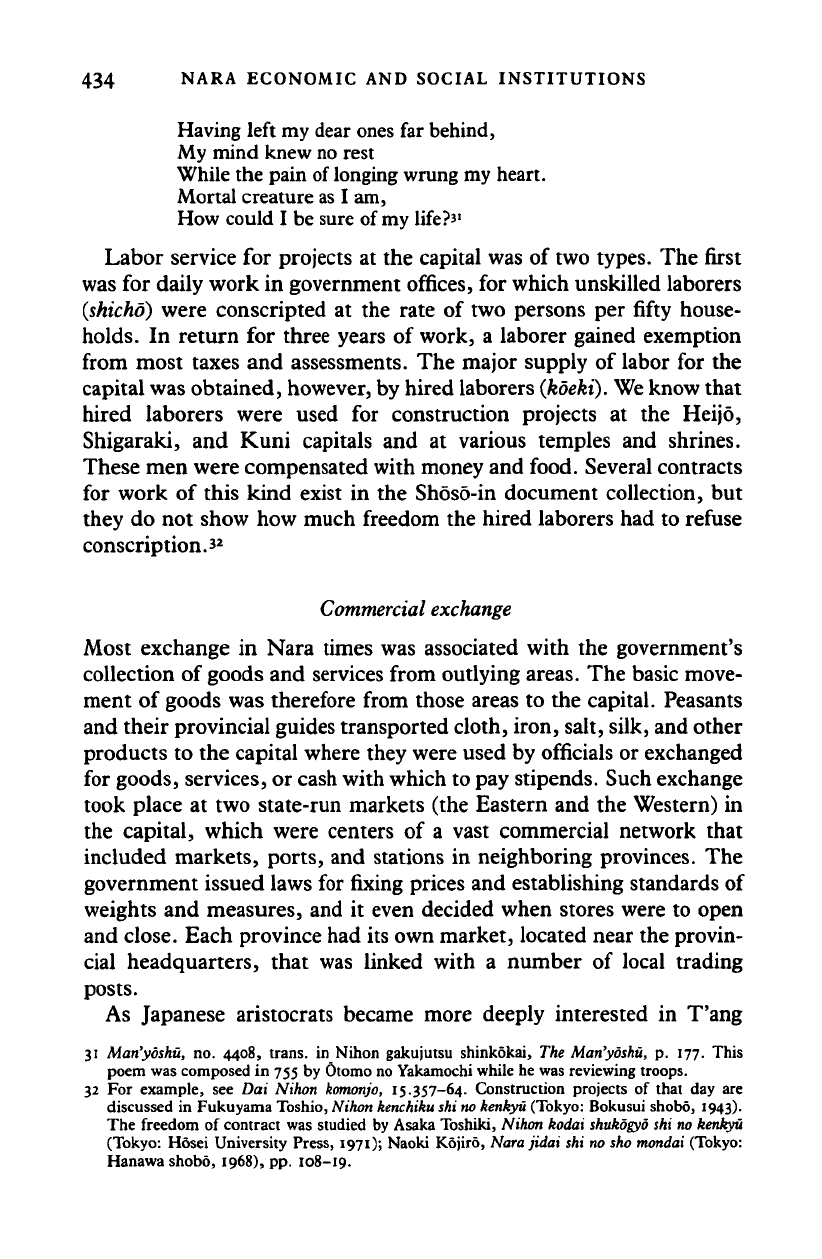
434 NARA ECONOMIC AND SOCIAL INSTITUTIONS
Having left my dear ones far behind,
My mind knew
no
rest
While the pain of longing wrung my heart.
Mortal creature
as
I am,
How could I be sure of
my
life?'
1
Labor service for projects at the capital was of two types. The first
was for daily work in government offices, for which unskilled laborers
(shicho)
were conscripted at the rate of two persons per fifty house-
holds.
In return for three years of work, a laborer gained exemption
from most taxes and assessments. The major supply of labor for the
capital was obtained, however, by hired laborers
(koekt).
We
know that
hired laborers were used for construction projects at the Heijo,
Shigaraki, and Kuni capitals and at various temples and shrines.
These men were compensated with money and food. Several contracts
for work of this kind exist in the Shoso-in document collection, but
they do not show how much freedom the hired laborers had to refuse
conscription.
3
2
Commercial
exchange
Most exchange in Nara times was associated with the government's
collection of goods and services from outlying areas. The basic move-
ment of goods was therefore from those areas to the capital. Peasants
and their provincial guides transported cloth, iron, salt, silk, and other
products to the capital where they were used by officials or exchanged
for goods, services, or cash with which to pay stipends. Such exchange
took place at two state-run markets (the Eastern and the Western) in
the capital, which were centers of a vast commercial network that
included markets, ports, and stations in neighboring provinces. The
government issued laws for fixing prices and establishing standards of
weights and measures, and it even decided when stores were to open
and close. Each province had its own market, located near the provin-
cial headquarters, that was linked with a number of local trading
posts.
As Japanese aristocrats became more deeply interested in T'ang
31 Man'yoshu, no. 4408, trans, in Nihon gakujutsu shinkokai, The Man'yoshu, p. 177. This
poem was composed in 755 by Otomo no Yakamochi while he was reviewing troops.
32 For example, see Dai Nihon komonjo, 15.357-64. Construction projects of that day are
discussed in Fukuyama Toshio, Nihon
kenchiku
shi
no kenkyu
(Tokyo: Bokusui shobo, 1943).
The freedom of contract was studied by Asaka Toshiki, Nihon kodai
shukogyo
shi no kenkyu
(Tokyo: Hosei University Press, 1971); Naoki Kojiro, Narajidai shi no sho mondai (Tokyo:
Hanawa shobo, 1968), pp. 108-19.
Cambridge Histories Online © Cambridge University Press, 2008
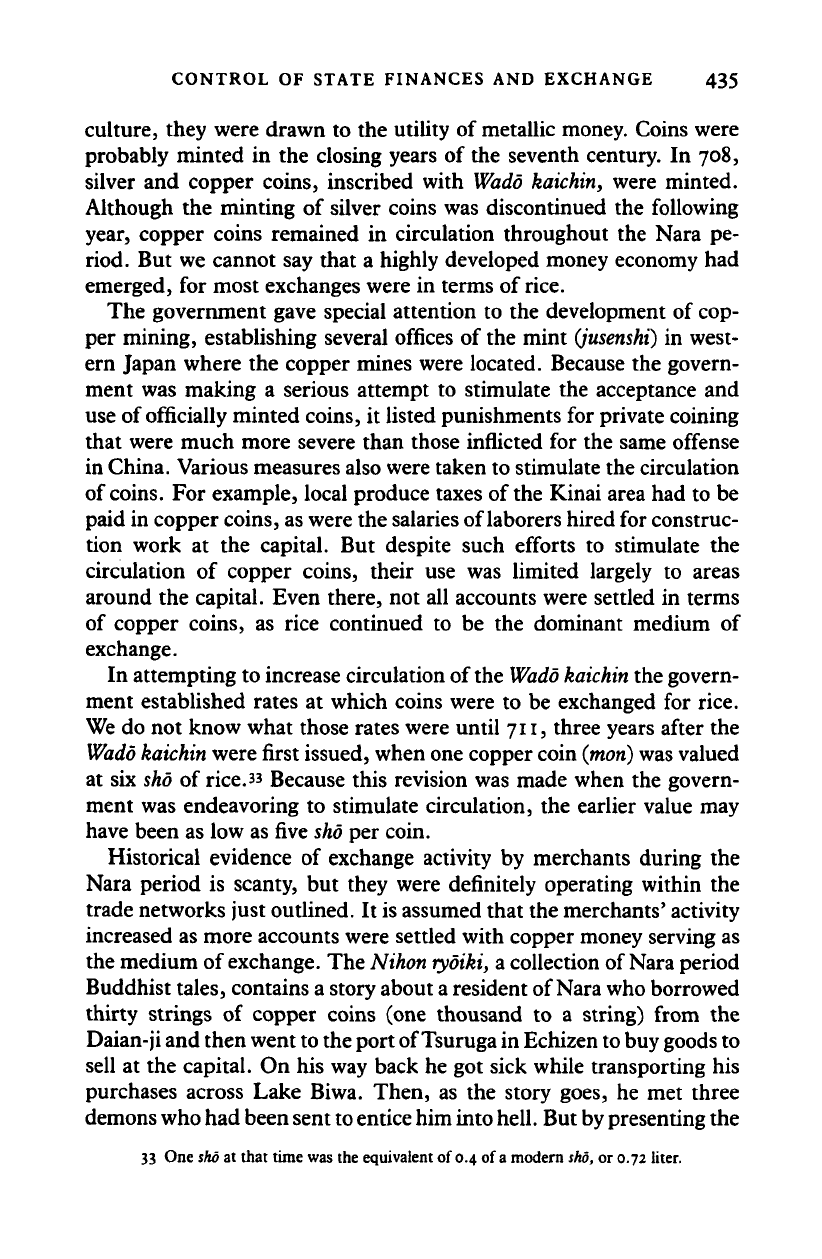
CONTROL OF STATE FINANCES AND EXCHANGE 435
culture, they were drawn to the utility of metallic money. Coins were
probably minted in the closing years of the seventh century. In 708,
silver and copper coins, inscribed with
Wado
kaichin, were minted.
Although the minting of silver coins was discontinued the following
year, copper coins remained in circulation throughout the Nara pe-
riod. But we cannot say that a highly developed money economy had
emerged, for most exchanges were in terms of rice.
The government gave special attention to the development of cop-
per mining, establishing several offices of the mint
(jusenshi)
in west-
ern Japan where the copper mines were located. Because the govern-
ment was making a serious attempt to stimulate the acceptance and
use of officially minted coins, it listed punishments for private coining
that were much more severe than those inflicted for the same offense
in China. Various measures also were taken to stimulate the circulation
of
coins.
For example, local produce taxes of the Kinai area had to be
paid in copper coins, as were the salaries of laborers hired for construc-
tion work at the capital. But despite such efforts to stimulate the
circulation of copper coins, their use was limited largely to areas
around the capital. Even there, not all accounts were settled in terms
of copper coins, as rice continued to be the dominant medium of
exchange.
In attempting to increase circulation of
the Wado kaichin
the govern-
ment established rates at which coins were to be exchanged for rice.
We do not know what those rates were until 711, three years after the
Wado kaichin
were first issued, when one copper coin
(mon)
was valued
at six
sho
of
rice.33
Because this revision was made when the govern-
ment was endeavoring to stimulate circulation, the earlier value may
have been as low as
five
sho
per coin.
Historical evidence of exchange activity by merchants during the
Nara period is scanty, but they were definitely operating within the
trade networks just outlined. It is assumed that the merchants' activity
increased as more accounts were settled with copper money serving as
the medium of
exchange.
The
Nihon
ryoiki,
a collection of Nara period
Buddhist tales, contains a story about
a
resident of Nara who borrowed
thirty strings of copper coins (one thousand to a string) from the
Daian-ji and then went
to the
port of Tsuruga in Echizen
to
buy goods to
sell at the capital. On his way back he got sick while transporting his
purchases across Lake Biwa. Then, as the story goes, he met three
demons who had been sent
to
entice him into
hell.
But by presenting the
33 One sho at that time was the equivalent of 0.4 of a modern
sho,
or 0.72 liter.
Cambridge Histories Online © Cambridge University Press, 2008
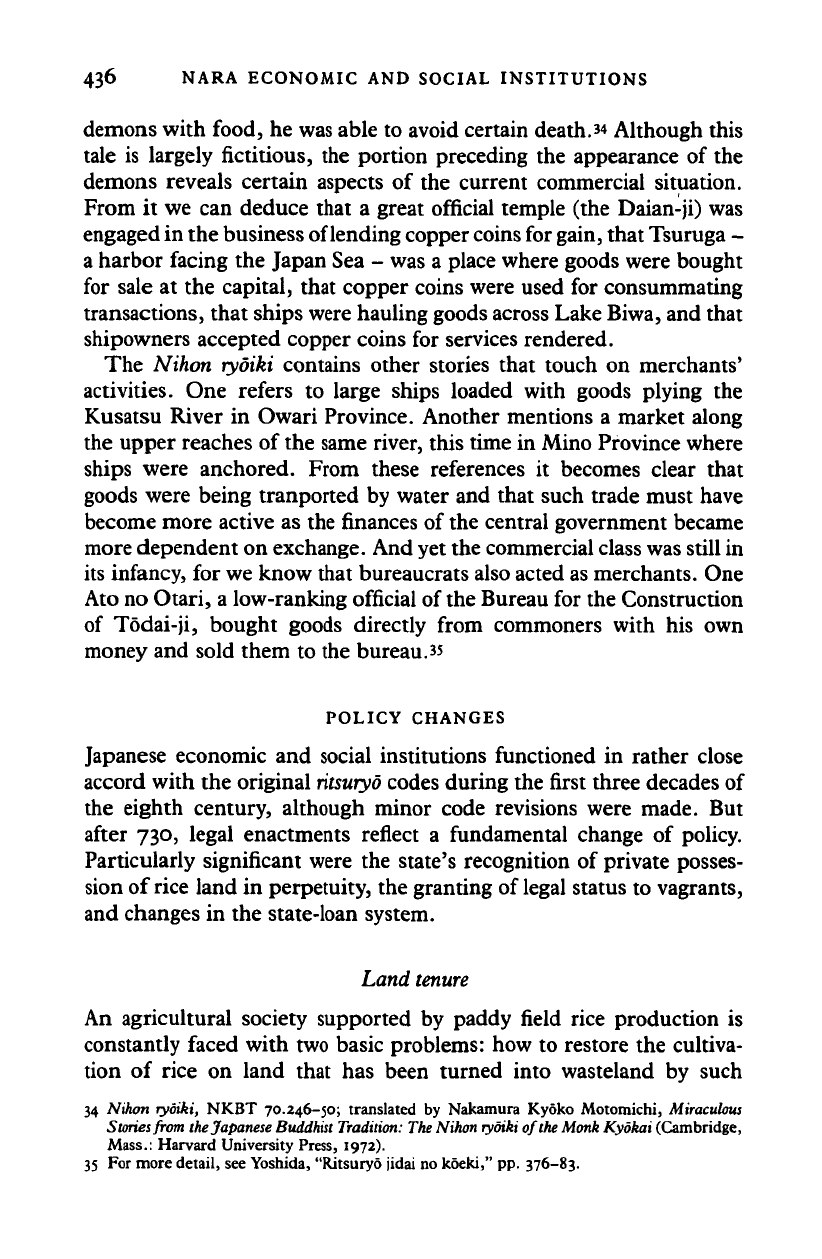
436 NARA ECONOMIC AND SOCIAL INSTITUTIONS
demons with food, he was able to avoid certain death.** Although this
tale is largely fictitious, the portion preceding the appearance of the
demons reveals certain aspects of the current commercial situation.
From it we can deduce that a great official temple (the Daian-ji) was
engaged in the business of lending copper
coins
for
gain,
that Tsuruga -
a harbor facing the Japan Sea - was a place where goods were bought
for sale at the capital, that copper coins were used for consummating
transactions, that ships were hauling goods across Lake Biwa, and that
shipowners accepted copper coins for services rendered.
The Nihon ryoiki contains other stories that touch on merchants'
activities. One refers to large ships loaded with goods plying the
Kusatsu River in Owari Province. Another mentions a market along
the upper reaches of the same river, this time in Mino Province where
ships were anchored. From these references it becomes clear that
goods were being tranported by water and that such trade must have
become more active as the finances of the central government became
more dependent on exchange. And yet the commercial class was still in
its infancy, for we know that bureaucrats also acted as merchants. One
Ato no Otari, a low-ranking official of the Bureau for the Construction
of Tddai-ji, bought goods directly from commoners with his own
money and sold them to the bureau.**
POLICY CHANGES
Japanese economic and social institutions functioned in rather close
accord with the original
ritsuryo
codes during the first three decades of
the eighth century, although minor code revisions were made. But
after 730, legal enactments reflect a fundamental change of policy.
Particularly significant were the state's recognition of private posses-
sion of
rice
land in perpetuity, the granting of legal status to vagrants,
and changes in the state-loan system.
Land
tenure
An agricultural society supported by paddy field rice production is
constantly faced with two basic problems: how to restore the cultiva-
tion of rice on land that has been turned into wasteland by such
34 Nihon ryoiki, NKBT 70.246-50; translated
by
Nakamura Kyoko Motomichi, Miraculous
Stones from the Japanese Buddhist Tradition: The Nihon ryoiki of the Monk Kyokai (Cambridge,
Mass.:
Harvard University Press, 1972).
35 For more detail, see Yoshida, "Ritsuryo jidai
no
koeki," pp. 376-83.
Cambridge Histories Online © Cambridge University Press, 2008
